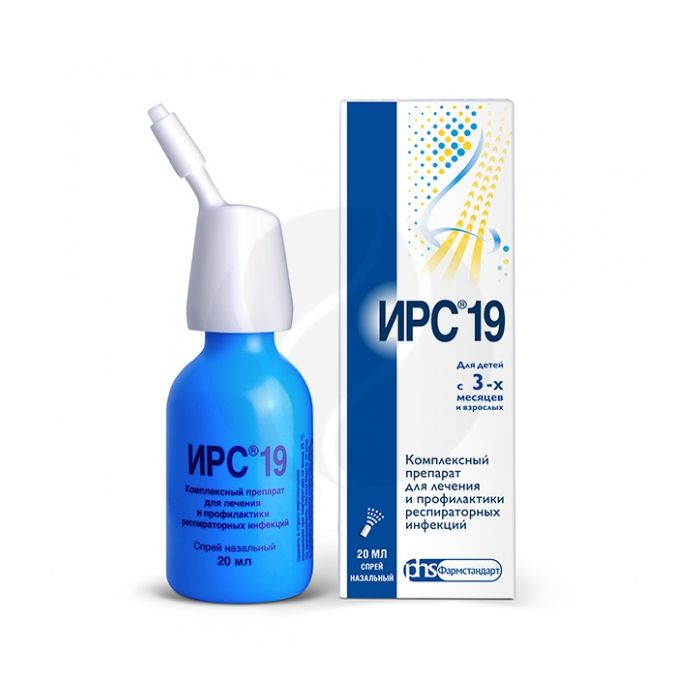IRS - 19 nasal spray 60 doses, 20ml
Expiration Date: 11/2025
Russian Pharmacy name:
ИРС - 19 спрей назальный 60доз, 20мл
treatment of acute, treatment and prevention of chronic diseases of the upper respiratory tract and bronchi;
restoration of local immunity after viral infections;
preparation for planned surgery on the ENT organs and in the postoperative period.
IRSЃ19 can be prescribed for both adults and children from 3 months of age
Intranasal 1 dose in each nasal passage (1 dose = 1 press of the atomizer):
for prophylaxis for adults and children from 3 months 2 times a day for 2 weeks;
for the treatment of children from 3 months to 3 years 2 times a day and children over 3 years old and adults 2 to 5 times a day until the symptoms of infection disappear.
To restore local immunity after viral infections, in preparation for planned surgery and in the postoperative period, children and adults 2 times a day for 2 weeks (the course of treatment is recommended to start 1 week before surgery)
100 ml
bacterial lysates - 43.27 ml,
incl. Streptococcus pneumoniae type I - 1.11 ml
Streptococcus pneumoniae type II - 1.11 ml
Streptococcus pneumoniae type III - 1.11 ml
Streptococcus pneumoniae type V - 1.11 ml
Streptococcus pneumoniae type VIII - 1.11 ml
Streptococcus pneumoniae type XII -1.11 ml
Haemophilus influenzae type B - 3.33 ml
Klebsiella pneumoniae ss pneumoniae - 6.66 ml
Staphylococcus aureus ss aureus - 9.99 ml
Acinetobacter calcoaceticus - 3.33 ml
Moraxella catarrhalis - 2.22 ml
Neisseria subflava - 2.22 ml
Neisseria perflava - 2.22 ml
Streptococcus pyogenes group A - 1.66 ml
Streptococcus dysgalactiae group C - 1.66 ml
Enterococcus faecium - 0.83 ml
Enterococcus faecalis - 0.83 ml
Streptococcus group G - 1.66 mg
Excipients: glycine - 4.25 g, sodium merthiolate - no more than 1.2 mg, nerol-based flavoring (linalol, alpha-terpineol, geraniol, methyl anthranilate, limonene, geranyl acetate, linalyl acetate, diethylene glycol monoethyl ether, phenylethyl alcohol 5 mg, purified water) - 12 - up to 100 ml.
autoimmune diseases;
hypersensitivity to the components of the combination.
Pharmachologic effect:
Increases specific and non-specific immunity. When sprayed, a fine aerosol is formed, which covers the nasal mucosa, which leads to the rapid development of a local immune response. Specific protection is due to locally formed antibodies of the class of secretory immunoglobulins type A (IgA), which prevent the fixation and multiplication of infectious agents on the mucous membrane. Nonspecific immunoprotection is manifested in an increase in the phagocytic activity of macrophages, an increase in the content of lysozyme.
Pharmacodynamics:
IRS 19 enhances specific and non-specific immunity. When sprayed with IRS 19, a fine aerosol is formed, which covers the nasal mucosa, which leads to the rapid development of a local immune response. Specific protection is due to locally formed antibodies of the class of secretory immunoglobulins type A (IgA), which prevent the fixation and reproduction of infectious agents on the mucous membrane. Nonspecific immunoprotection is manifested in an increase in the phagocytic activity of macrophages and an increase in the content of lysozyme.
Pharmacokinetics:
The drug primarily acts in the upper respiratory tract; there is currently no data on systemic absorption of the drug.
Application for pregnancy and children:
Not recommended during pregnancy (there are no data on the potential for teratogenic or toxic effects on the fetus).
Side effects:
rarely - hypersensitivity reactions (urticaria, angioedema) and skin erythema-like and eczema-like reactions;
asthma attacks and coughing;
temperature rise (39 ? C),
nausea,
vomiting
abdominal pain,
diarrhea,
rhinopharyngitis,
sinusitis,
laryngitis,
bronchitis
Overdose:
Overdose cases are unknown
Influence on the ability to drive vehicles and mechanisms:
Has no effect.
Interaction with other medicinal products:
Negative interactions unknown
Special instructions:
If the temperature rises (39 ? C), treatment should be canceled. When prescribing to patients with bronchial asthma, asthma attacks may occur, in this case it is recommended to stop treatment

